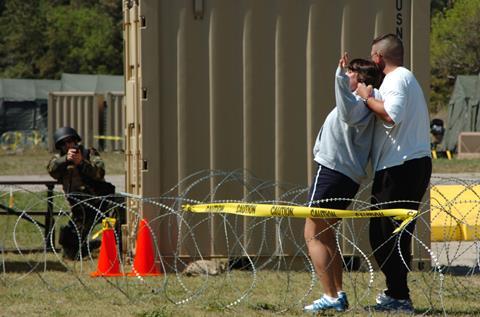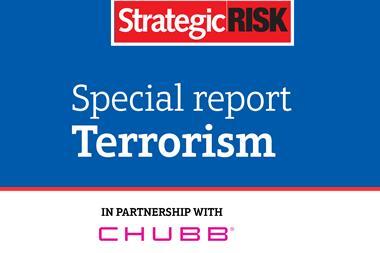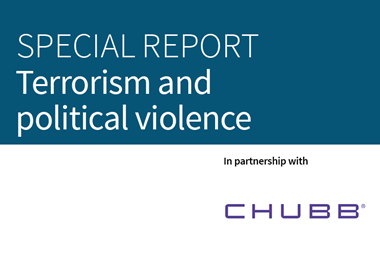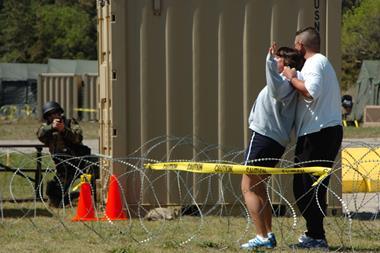Political instability can be felt closer to home, with new risks being manifested

Since 9/11, the Western world has been acutely aware of the risk of terrorism. Although political extremism may not be new to a continent that has already faced groups such as Baader-Meinhof and the IRA, the Islamic State (IS) has driven up the size and scale of attacks, bringing with it a greater ferocity, as seen in its soft targeting of civilians.
Within those parameters, however, the nature of the terrorist risk has changed dramatically in 15 years, with larger-scale attacks such as truck bombs becoming less likely, even as the threat of a ‘lone wolf’ hitting a soft target with improvised weapons or firearms has risen. Many experts are concerned about the potential for returning jihadis with experience in Iraq and Syria to increase this risk further.
Informational risk
“The level of co-operation and information-sharing between the security services has increased dramatically over the years, together with increasing sophistication of monitoring, which has made things more difficult [for terrorist groups],” says Global Risk Analysis associate director Jonathan Wood. “However, this has come at a time where there is a growing breakdown in some aspects of society.”
Of particular concern is the risk of alienation within minority elements of British and French Muslim communities. Verisk Maplecroft MENA head Anthony Skinner says: “Since 9/11, the 2004 Madrid train bombings and the 2005 London bombings, carrying out major transnational attacks has become harder.
“After many years of failing to carry out a follow-up attack, the strategy has changed to leaderless, improvised, lone-wolf attacks.
“The risk increased recently because the rise of IS has been accompanied by some sophisticated use of propaganda – especially through social media – and this may result in a rise in the number of lone-wolf attacks, although this is not yet proven.”
Skinner continues: “It’s not just the attack itself that is important, but the scale of the publicity after-wards: this is where social media comes in.”
Arguably, there is more political radicalisation across Europe
now than at any time since before the second world war, as support for nationalist parties and more radical movements grows in response to socioeconomic problems and a perceived failure by elites to deal with the situation or prevent the crisis.
“We’re just coming out of a nasty recession that has affected people’s attitudes – commercially and politically – and as a consequence, there is a lot of unrest and many minority groups are in a strong position because of this weakness,” says Stuart Poole-Robb, chief executive at KCS Strategic Intelligence and Corporate Security. “The rise of nationalism in Europe is an expression of a broader and deeper instability across the world.”
However, despite past attacks by groups such as the IRA, the main risk posed by rising nationalism currently comes from political instability and the increased risk of criminal-type activity such as riots, arson or attacks on individuals.
Business interruption
At a corporate level, the likelihood of being targeted by a bombing or shooting in Europe is low; the real vulnerability is business disruption here or overseas. “Organisations should ensure there are measures in place to cope with a variety of scenarios,” says Wood. “However, it is also vital to ensure local communities have a stake in your business succeeding at a local level.
“Oil and gas investors should pay particular attention to unstable environments where political conditions can change rapidly, and have well-prepared crisis plans in place. They also need to be aware of their vulnerabilities in other areas.
“If local security staff go on strike and are not doing their job, all of a sudden, in an unstable context firms could face the real risk of their plant being taken over by more odious elements.”
Skinner adds: “It’s important to maintain situational awareness, at the sub-national level (what is happening around your project?) and at the strategic level (what is happening nationally, politically, where are sectarian relationships?).
“It is also vital to be aware of the kinds of targets at risk – and is this changing. Do attacks tend to be targeted against key assets? Or are they like to be more opportunistic?”
To read our full report on terrorism and political violence, please click here
To download our full report on terrorism and political violence, please click here
CASE STUDY: InterContinental Hotels Group plc
The InterContinental Hotels Group (IHG) found itself on the front line during the 2013 political upheaval in Egypt when a mob attacked its Semiramis InterContinental Hotel in Cairo and many other assets were affected across the region. Thanks to excellent risk management, no one was killed.
John Ludlow, senior vice-president and head of Global Risk Management at the firm, says: “Political instability is of increasing concern to multinationals in that companies are becoming more and more aware of the potential effects of political instability to the wider business environment – such as business confidence, legal and regulatory constraints, financial conditions and reputation – consequently, geopolitical intelligence is of value to business as a whole, rather than only to risk management.”
Geopolitical complexity
IHG has seen geopolitical instability diversifying and be-coming increasingly complex, with political and economic uncertainties creating a context in which Ludlow argues that kinetic threats and risks, such as terrorism, insurgency and political violence, can flourish.
“The challenge for IHG was protecting our hotels, guests and employees from the political violence that accompanied these transitions and the heightened ambient security environment borne of the political instability.
“A secondary challenge was continuing to operate safe and secure hotels and resorts, while also being able to pay salaries during extended periods of significantly reduced revenue and securing a constant delivery of essential supplies.”
To do this, IHG has developed an intelligence-led, threat-based approach to security underpinning a risk-based approach to protecting IHG’s interests, assets, people and reputation. “Intelligence, and the situational awareness that this brings, is a key component of managing these risks,” says Ludlow. “IHG is constantly looking for ways to increase the span and effectiveness of its security intelligence capability to assess how current geopolitical situations may evolve and affect its current operations and then predict likely new situations and their likely course.”
There has been a significant increase in security resourcing and an increase in staff from two to 17 since 2007.
“IHG also has a formal threat management system that disseminates threat information and provides mitigating action advice,” says Ludlow.
“This is underpinned by a ‘Hotel Security Categorisation System’, which ensures that hotels in high-risk areas are designed and operated appropriately to the ambient threat environment and a ‘Hotel Security Alert System’ that ensures hotels can respond appropriately to short-term dynamic threats.
“Additionally, IHG has a net-work of approximately 600 security managers and champions who work as a security community to provide on-the-ground situation reports and information gained from local contacts.
“At the strategic level, the security team liaises with governmental security agencies and other corporate security teams around the globe. Intelligence is also provided by a number of commercial security providers.”
Travel risk management
In response to the Cairo events in 2013, IHG reviewed and refreshed its crisis management programme.
“We designed [the programme] in a stage to respond to what is referred to as ‘Emerging Issues’, seeking to formally respond to issues that have the potential to become crises in order to prevent them,” says Ludlow.
“This approach puts IHG on the front foot and enables it to proactively respond to intelligence or situations.”
IHG also has in place a well-developed ‘Employee Traveller Risk Management Programme’ that tracks IHG customers and provides travel-risk support to travellers in both high- and very high-risk countries.
Key security lessons from InterContinental Hotel Group
- Situational awareness – internally and externally – is king
- Time spent on security, crisis management planning, training and testing is invaluable
- The law of unintended consequences rules, meaning teams should be able to respond appropriately
- Think before acting
- Never presume the actions of others within the organisation
- Organisational resilience is critical – it will be impossible to ‘catch’ everything
- Successfully navigating challenges needs leadership
- Prevent a potential crisis by identifying it as an emerging issue, and name a crisis/risk owner to take charge
- Risk management’s job is to identify issues, make risk owners aware and support them in dealing with the issue
- Act responsibly and have moral courage
- Get leadership on board
- Crisis is an ideal opportunity for risk managers to demonstrate their value
Downloads
Special report
PDF, Size 2.77 mb




















No comments yet